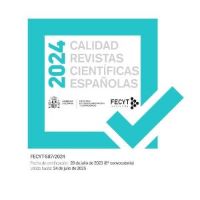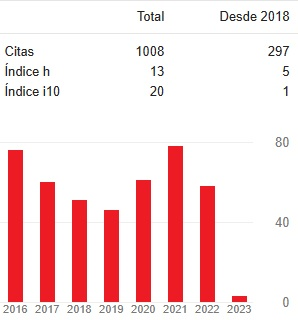THE RIGHTS OF WOMEN: FROM THE REPUBLIC TO THE DICTATORSHIP GOING TRHOUGH CIVIL WAR
DOI:
https://doi.org/10.51743/cih.204Keywords:
Dictatorship, Republic, civil war, right to vote, Women's Section, WomanAbstract
At the beginning of the 20th century women faced significant social inequality and could not participate in public life. Notably, female suffrage was forbidden at this time and their lives were reduced to the private sphere. This period was characterized by a strong division of labour based on class and gender. Women were expected to perform unpaid labour in the home, looking after their families and answering to the men in their lives. Consequently, there were few opportunities to seek professional training, increasing the dependence on husbands, in the case of married women, or their fathers if they were single. The Republic empowered women and provided new opportunities that would offer upward social mobility. For example, they were permitted in politics and could realize the potential to work for higher-up positions. Women began to be recognized as active participants in society, resulting in an increase in equality and a shift from the stigma that historically marked them as homemakers. In the same moment, the civil war was taking hold of Spain along with the Falangist conquest of territories. As a result, previous thoughts and ideas were once again implanted in society and reversed any immediate progress towards social equality. However, the dose of freedom experienced during the Republic left behind a revolutionary spirit, one which re-remerged in the final years of the dictatorial stage.
Downloads
Global Statistics ℹ️
|
1098
Views
|
1805
Downloads
|
|
2903
Total
|
|
References
ESTARLICH MARTORRELL, M. (2018) La mujer en los años de la II República: una lectura propia, Revista hispanoamericana de historia de las ideas, núm. 39.
CAMPOAMOR, C. (2001) Mi pecado mortal. El voto femenino y yo, Instituto Andaluz de la Mujer, Sevilla
CASTÁN TOBEÑAS, J. (1955) La condición social y jurídica de la mujer. La diferenciación de los sexos en sus aspectos biológico, sociológico, ético y jurídico, Reus, Madrid.
GARCÍA BASAURI, M. (1978) La mujer en el reinado de Alfonso XIII. Una aproximación al primer movimiento feminista español, Tiempo de Historia, núm. 46
GIL GASCÓN, F. y GÓMEZ GARCÍA, S. (2014) El uso propagandístico de la mujer nacional durante la guerra civil: ‘noticiario español’ (1938-1939), Índex Comunicación, núm. 4.
GÓMEZ BLESA, M. (2010) Modernas y vanguardistas: mujer y democracia en la II República, Ediciones del Laberinto, Madrid.
MARTÍNEZ SIERRA, M. (1931) La mujer española ante la República, Ediciones de la Esfinge, Madrid.
MORANT, I. (2006) Historia de las mujeres en España y América latina, Cátedra, Madrid, p. 442. Véase también a PECHARROMÁN, J. L., (2006) Segunda República Española (1931-1936). Biblioteca Nueva, Madrid.
MORAGA GARCÍA, M. (2008) Notas sobre la situación jurídica de la mujer en el franquismo, Feminismos DOI: https://doi.org/10.14198/fem.2008.12.09
NASH, M. (2003) Dones ciutadanes a Catalunya: la Segona República, Historia de les dones, Setmanari el temps, Valencia, núm. 4.
NICOLÁS MARÍN, E. (2005) La libertad encadenada. España en la dictadura franquista 1939-1975, Madrid, Alianza.
NUÑEZ PEREZ, G., (1993) Evolución de la situación laboral de las mujeres en España durante la Segunda República (1931-1936). Cuadernos Relaciones laborales, núm. 3.
ORTIZ HERAS, M. (2006) Mujer y Dictadura Franquista, Aposta. Revista de ciencias Sociales, núm. 28.
OLIVER OLMO, P. y CUBERO IZQUIERDO, M. C., (2020) De los controles disciplinarios a los controles securitarios, Ediciones Universidad de Castilla la Mancha. DOI: https://doi.org/10.18239/jornadas_2020.25.00
PAJOT, G. (1954) La mujer casada en el derecho comparado, Revista de derecho notarial, Madrid.
PESTAÑA RUIZ, C. (2015) Evolución jurídica de la mujer casada en el sistema matrimonial español de la época preconstitucional, Revista de Estudios Jurídicos, Jaén, núm. 15 DOI: https://doi.org/10.17561/rej.n16.a7
PÉREZ ROYO, J. (1996) Curso de Derecho Constitucional, Marcial Pons, Madrid.
RAMOS PALOMO, M. (2001) Feminismo y acción colectiva en la España de la primera mitad del siglo XX, en Manuel Ortiz Heras, David Ruiz González e Isidro Sánchez Sánchez (Coordinadores), Movimientos sociales y estado en la España contemporánea, Cuenca, UCLM.
VENTURA FRANCH, A. (1999) Las Mujeres y la Constitución Española de 1978, Ministerio de Trabajo y Asuntos Sociales, Instituto de la Mujer, Madrid.
ZAMBRANO, M. (1998) Delirio y Destino (los veinte años de una española). Barcelona, Mondadori España.
Downloads
Published
How to Cite
Issue
Section
License
The Fundación Universitaria Española publishing house preserves the patrimonial rights (copyright) of published works, and encourages and allows their reuse. The works are published in the electronic edition of the journal under a license “Creative Commons Atribución/Reconocimiento-NoComercial 4.0 Licencia Pública Internacional — CC BY-NC 4.0”, and can be copied, used, disseminated, transmitted and publicly exhibited, provided that : a) the authorship and original source of its publication is cited (journal, publisher and URL of the work); b) are not used for commercial purposes; c) the existence and specifications of this license of use are mentioned.
The author / s partially transfer the property rights (copyright) of this work to the Fundación Universitaria Española (Spain) (NIF: G28433670), for the printed and online editions.
It also declares to have respected the ethical principles of research and to be free from any conflict of interest.
«C.I.H.» encourages the authors and the scientific community to the maximum promotion and dissemination of the works in their final version through:
1) Your list of contacts (emails) and social networks (Facebook, Twitter, LinkedIn ...).
2) Institutional repository of your University and public repositories (Mendeley, Cosis ...).
3) Scientific social networks (ResearchGate, Academia.edu, Kudos ...).
4) Personal or institutional website, blog, etc.
5) Google Scholar, ORCID, ResearchID, ScopusID, Dimensions, PlumX ...
6) Printed copies purchased directly and sent to specialists for reading and subsequent citation if appropriate.
For the nomination of future articles by authors of "C.I.H.", the impact of previous works will be taken into account, so that those with citation higher than the annual average of the journal will be preferred.












2.jpg)
















1.png)
1.png)

1.png)


.png)
.png)

.png)
1.png)
1.png)
